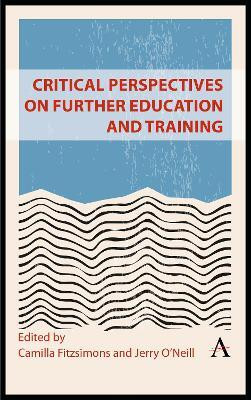Critical Perspectives on Further Education and Training(English, Paperback, unknown)
Quick Overview
Product Price Comparison
This book responds to and informs, the rapid growth in adult, community, and further education in Ireland and beyond. Across 11 chapters, academic and practitioner insights are explored. There are chapters that focus on policy trends across the topics, some of which focus on current trends in policy and practice and some of which focus more deliberately on everyday practice. The book opens with perspectives from some further education students who comment on some of the themes raised. These lead into an introduction which describes the landscape of a complex, heterogeneous FET sector and outlines what the authors mean by critical perspectives on adult, community and further education in Ireland. This is followed by the philosophically oriented chapter one, written by Camilla Fitzsimons, that provides practical examples of possibilities for 'engaged pedagogy' amidst curricula that, on the surface appear far removed from the dimensions of power and privilege the book lays bare. In chapter two, experienced further and higher education practitioner, Sarah Coss offers a practical and thought-provoking account of the challenges of working creatively and dialogically with FE curricula whilst at the same time attending to the many bureaucratised demands of accreditation and quality assurance frameworks. Chapter three, written by Lilian Nwanze, builds a case for the importance of discussions about racism and white privilege in FE and proposes concrete actions to embody and anti-racist approach, the last of which is an emphasis on love. In chapter four, Jane O'Kelly presents a reflexive exploration of neurodiversity in adults and prompts us to consider whether their needs are recognised and accommodated in further education and training settings. In chapter five, Brid Connolly explores ways in which a feminist egalitarian groupwork stance, can draw from social movements, adult and community education to create an FE pedagogy that challenges the status quo of education as a social institution. In chapter six, Eilish Dillon reflects on why a critical approach to global citizenship education (GCE) is important and introduces some debates about the meaning and implementation of GCE. In chapter seven, Jerry O'Neill's partially-poetic chapter demonstrates a creative and critical approach to individual and group reflexive practices which, he argues, is core not just to the ongoing professional development of all FET practitioners and the sector itself, but can also be seen as form of practitioner-based creative research in itself. Leo Casey follows in chapter eight by exploring some of the overlooked connections between adult learning and digital literacy and argues for a policy balance between models of human capital and the interests of big technology and how teaching and learning for Digital World Literacy can value lifelong learning. In chapter nine, primary research by Eve Cobain, Suzanne Kyle and Susan Cullinane link community education to social movement theory and Ireland's community development, anti-poverty movement of the 1980s and 1990s. They analyse the experiences of practitioners as they navigate the very different neoliberal oriented contemporary landscape. In chapter ten, Brendan Kavanagh, Francesca Lorenzi and Elaine Macdonald explore the process of teacher identity and (trans)formation of what they term 'second career teachers' within further education colleges. In chapter eleven, Camilla and Jerry highlight the very real challenges facing educators working in a field that is characterised by high levels of precarity and argue that realising a high-quality critical and sustainable, distinct professional pathway for emerging educators must become a policy priority for any government that is serious about recognising the value and potential of the FET sector. In the methodological spirit of adult education, this contribution closes with a group dialogue between authors from across these chapters as we look forward to the work to be done and consider our hopes for the future of FET.


